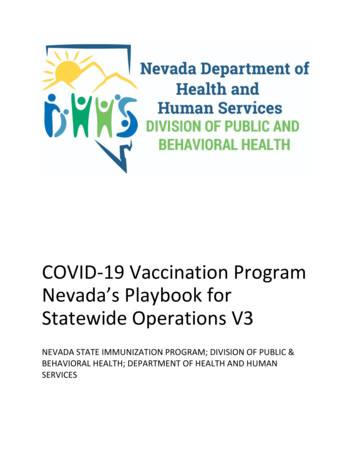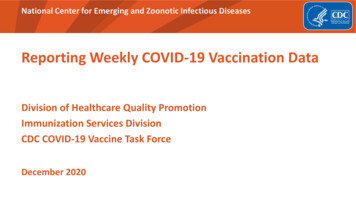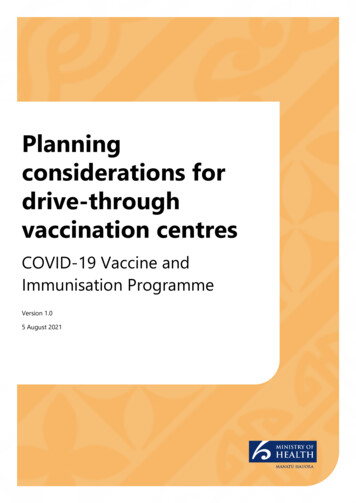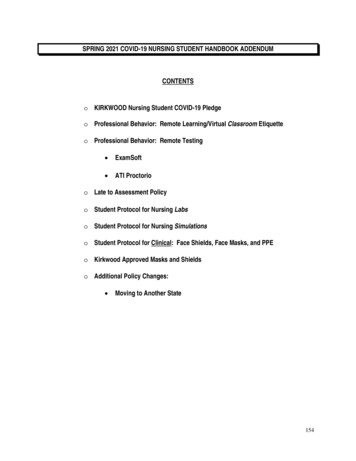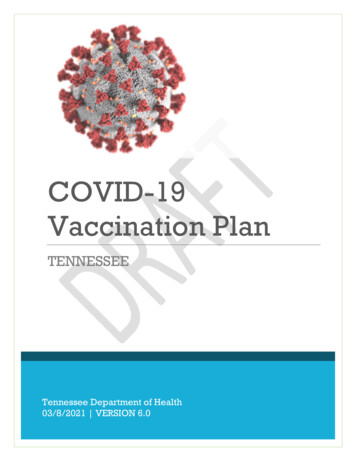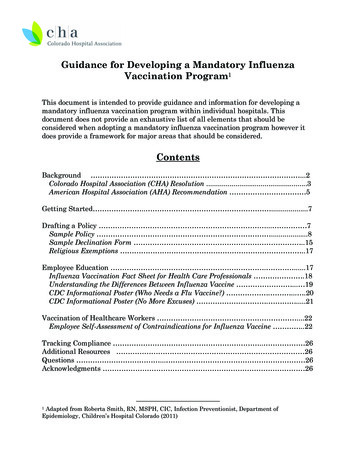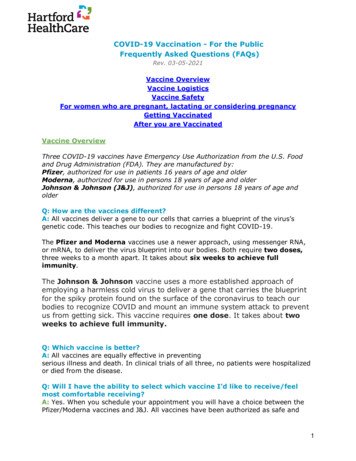
Transcription
COVID-19 Vaccination - For the PublicFrequently Asked Questions (FAQs)Rev. 03-05-2021Vaccine OverviewVaccine LogisticsVaccine SafetyFor women who are pregnant, lactating or considering pregnancyGetting VaccinatedAfter you are VaccinatedVaccine OverviewThree COVID-19 vaccines have Emergency Use Authorization from the U.S. Foodand Drug Administration (FDA). They are manufactured by:Pfizer, authorized for use in patients 16 years of age and olderModerna, authorized for use in persons 18 years of age and olderJohnson & Johnson (J&J), authorized for use in persons 18 years of age andolderQ: How are the vaccines different?A: All vaccines deliver a gene to our cells that carries a blueprint of the virus’sgenetic code. This teaches our bodies to recognize and fight COVID-19.The Pfizer and Moderna vaccines use a newer approach, using messenger RNA,or mRNA, to deliver the virus blueprint into our bodies. Both require two doses,three weeks to a month apart. It takes about six weeks to achieve fullimmunity.The Johnson & Johnson vaccine uses a more established approach ofemploying a harmless cold virus to deliver a gene that carries the blueprintfor the spiky protein found on the surface of the coronavirus to teach ourbodies to recognize COVID and mount an immune system attack to preventus from getting sick. This vaccine requires one dose. It takes about twoweeks to achieve full immunity.Q: Which vaccine is better?A: All vaccines are equally effective in preventingserious illness and death. In clinical trials of all three, no patients were hospitalizedor died from the disease.Q: Will I have the ability to select which vaccine I’d like to receive/feelmost comfortable receiving?A: Yes. When you schedule your appointment you will have a choice between thePfizer/Moderna vaccines and J&J. All vaccines have been authorized as safe and1
COVID-19 Vaccination - For the PublicFrequently Asked Questions (FAQs)Rev. 03-05-2021effective protection against COVID-19. Vaccine supply is limited and availability ofspecific vaccines varies from week to week, depending on shipments. You may beable to find an earlier appointment if you are willing to accept any availablevaccine.Vaccine LogisticsQ: Will I have to pay anything if I get my vaccine through HartfordHealthCare?A: HHC will bill your insurance for vaccine administration reimbursement. Checkwith your insurance company about any costs you may be responsible for.Q: Will I need an appointment to receive the vaccine?A: Yes, vaccination is by appointment only.Q: Where will the vaccine be offered?A: You will be able to choose from multiple vaccine clinic locations when youschedule your appointment.Q: What if I make an appointment, but then get a sooner appointmentelsewhere or am unable to make it for my scheduled vaccine?A: If you are unable to keep your appointment, please cancel it. Vaccines are inhigh demand and no-shows take appointments away from others who need them.Q: Once I have received the required vaccine dose/doses, must I continueto wear a mask and take other precautions against COVID-19?A: Yes. At least for now it is important to follow all precautions including wearing amask, keeping physical distance from others and frequent handwashing. Researchcontinues, but no vaccine provides 100% protection against COVID-19 and it maybe possible to become infected and spread COVID-19 germs, even if the vaccinekeeps you from getting sick.Vaccine SafetyRead full FDA Briefing Document on the Pfizer-BioNTech COVID-19 Vaccine here.Read full FDA Briefing Document on the Moderna COVID-19 Vaccine here.Read the full FDA Briefing Document on the Johnson & Johnson COVID-19 Vaccinehere.Q: Are the vaccines safe and effective?A: Data we have indicates that the vaccines are safe. Thus far, no serious longterm side effects have occurred, and any side effects that do occur are not severeand occur within six weeks of vaccination. The U.S. Food and Drug Administration(FDA) will continue to monitor for safety issues.2
COVID-19 Vaccination - For the PublicFrequently Asked Questions (FAQs)Rev. 03-05-2021Q: How does the vaccine work?A: All vaccines deliver a gene to our cells that carries a blueprint of the virus’sgenetic code. This teaches our bodies to recognize and fight COVID-19.The Pfizer and Moderna vaccines use a newer approach, using messenger RNA,or mRNA, to deliver the virus blueprint into our bodies. Both require two doses,three weeks to a month apart. It takes about six weeks to achieve fullimmunity.The Johnson & Johnson vaccine uses a more established approach ofemploying a harmless cold virus to deliver a gene that carries the blueprintfor the spiky protein found on the surface of the coronavirus to teach ourbodies to recognize COVID and mount an immune system attack to preventus from getting sick. This vaccine requires one dose. It takes about twoweeks to achieve full immunity.Q: Can I get COVID-19 from receiving the vaccine?A: No. The vaccine does not contain live or dead virus, so it cannot infect you withCOVID-19.Q: Should I get the vaccine if I am immunocompromised?A: At present, there is not enough data to make conclusions about the efficacy andsafety of the vaccine in immunocompromised patients. However, animmunocompromised state does not mean one cannot get the vaccine and theCOVID-19 vaccine should be offered. The decision to be vaccinated should involve adiscussion between you and your care provider.Q: I have had previous severe allergic reactions. Is it safe for me to get thevaccine?A: Patients who have had anaphylaxis (severe allergic reaction) to a vaccine orinjectable medication should schedule your appointment at a hospital-based clinicwhere emergency room care is available. For other types of allergies, you mayschedule a vaccine at any community clinic.Q: What are the recommendations with regard to receiving the COVID-19vaccine and elective surgery?A: Elective surgery is not a contraindication to receiving the vaccine. However,there is not enough evidence to give definitive recommendations when it comes tothe optimal timing of vaccine administration and surgery.Q: Does the flu vaccine protect you from getting COVID-19?A: No. The coronavirus and the influenza virus are different. The flu vaccine doesnot protect you from becoming infected with the coronavirus, so you should get the3
COVID-19 Vaccination - For the PublicFrequently Asked Questions (FAQs)Rev. 03-05-2021COVID-19 vaccine in addition to the flu vaccine. A recent study suggested thatpeople who received the flu vaccine faced a lower risk for being hospitalized if theygot COVID-19.Q: Will the vaccines protect against newly reported strains of COVID-19?A: At this time, there is not enough information to say for certain if new strains canchallenge the efficacy of COVID-19 vaccines. It’s important to understand that newstrains occur when the virus is allowed to spread. By getting vaccinated, we canreduce the risk of the virus spreading and mutating further, creating new strains.Q: Is it true that the vaccine can trigger autoimmune diseases such asmultiple sclerosis (MS)?A: All vaccines may have associated side effects but at this time, there is no scienceto support that the COVID-19 vaccine will cause or trigger autoimmune diseases,including but not limited to multiple sclerosis.Q: Typically it takes many years to develop a vaccine; were corners cut toapprove the COVID-19 vaccines so quickly?A: Scientists tell us that all of the same safety precautions used for developingother vaccines have been followed for the COVID-19 vaccines. There are tworeasons why the process could be fast tracked: First, scientists were able to starttheir work before there was a known case of the novel coronavirus in this country,using the viral genome shared online as a template. In addition, the technologyused to produce both vaccines was already in development for other viruses, so itjust required a little bit of tweaking to make them effective against COVID-19.Q: I am still not sure about the vaccine or I have additional questionsabout vaccine safety. Where can I find resources?A: Please visit the FDA’s COVID-19 Vaccines webpage for more information.For women who are pregnant, lactating or considering pregnancyFor guidance from the American College of Obstetricians and Gynecologists (ACOG)click HERE.Pregnancy and the COVID-19 Vaccine UpdateThe recommendation by the World Health Organization (WHO) that the ModernaCOVID-19 vaccine should not be given to pregnant women unless they arehealthcare workers or at high risk of exposure is an interpretation of the AmericanCollege of Obstetricians and Gynecologists (ACOG) recommendations on thevaccine. Available data suggests that symptomatic pregnant patients with COVID19 or with comorbidities such as diabetes, obesity or hypertension, are at anincreased risk of more severe illness compared with non-pregnant patients, thusthe vaccine should not be withheld if requested. The WHO recommendation is also4
COVID-19 Vaccination - For the PublicFrequently Asked Questions (FAQs)Rev. 03-05-2021consistent with ACOG’s opinion that the vaccine poses no risk to lactating women ortheir babies.The risks of getting sick from COVID are higher and pregnant patients shouldconsider getting the vaccine if they: Have contact with people outside the home Are 35 years of age or older Are overweight Have medical problems like diabetes, high blood pressure, or heart disease Are a smoker Are a member of a racial or ethnic minority, or live in a community with highrate of COVID infections Are a healthcare workerIf you decide to receive a COVID-19 vaccine while pregnant or breastfeeding, orconsidering pregnancy, think about enrolling in one of the available registriestracking vaccine effects. The purpose of these registries is to identify patients whoare pregnant, postpartum, lactating, and/or contemplating pregnancy and receive aCOVID-19 vaccine in order to determine any post-vaccination effects or potentiallyinvolve participants in quality improvement or research studies. Participation isvoluntary.Some registries/resources for consideration include: CDC V-Safe ProgramV-safe is a smartphone-based tool that uses text messaging and web surveysto provide personalized health check-ins after you receive a COVID-19vaccination. Through v-safe, you can quickly tell the CDC if you have anyside effects after getting the COVID-19 vaccine. You can register HERE. University of WashingtonYou are invited to participate in an online registry of persons who receive theCOVID-19 vaccine and who are also pregnant, postpartum, lactating and/orcontemplating pregnancy. Click HERE to participate. Moderna pregnancy exposure registryWomen who are vaccinated with Moderna COVID‑ 19 Vaccine duringpregnancy are encouraged to enroll in the registry by calling1‑ 866‑ MODERNA (1‑ 866‑ 663‑ 3762).Q: What are the risks of getting COVID-19 during pregnancy?A: Recently published data demonstrates that symptomatic pregnant patients withCOVID-19 are at increased risk of more severe illness compared with non-pregnant5
COVID-19 Vaccination - For the PublicFrequently Asked Questions (FAQs)Rev. 03-05-2021patients. While the absolute risk of pregnant women developing severe COVID-19 islow, symptomatic pregnant women who develop severe illness are at increased riskfor intensive care unit (ICU) admission, need for mechanical ventilation,extracorporeal membrane oxygenation (ECMO) and death compared tosymptomatic non-pregnant women. Pre-existing medical conditions such as obesityand diabetes may place a pregnant patient at even higher risk of developing severeCOVID-19 illness. Additionally, Black and Hispanic pregnant women have higherrates of COVID-19 infection and death. Finally, pregnant Asian and NativeHawaiian/Pacific Islander pregnant patients have higher rates of ICU admission forsevere COVID- 19 illness.Q: Can I get the vaccine if I am pregnant?A: At this time, there is insufficient data to recommend whether or not pregnantwomen should get the vaccine, however, evidence suggests that pregnant womenare potentially at increased risk for severe COVID-19-associated illness and deathcompared to non-pregnant women, underscoring the importance of diseaseprevention in this population. The COVID-19 vaccine should be offered to pregnant,lactating and non-lactating women. The decision to be vaccinated should involve adiscussion between the woman and her care provider. Important considerationsregarding risk and benefit include: Level of activity of COVID-19 infection in the community Efficacy of the vaccines Risk and potential severity of maternal COVID-19 infection due to pregnancyand associated co-morbidities The safety of the vaccine for pregnant patients and the fetusQ: Can I get the vaccine if I am breastfeeding?A: While breastfeeding women were not included in clinical trials of the COVID-19vaccines to date, the American College of Obstetricians and Gynecologists (ACOG)recommends COVID-19 vaccines be offered to breastfeeding women similar to nonbreastfeeding people who meet criteria for receipt of the vaccine. There is no needto avoid initiation or discontinue breastfeeding in women who receive a COVID-19vaccine.Q: Is it true that the vaccine can cause infertility or pregnancy loss inwomen?A: False reports on social media claim that the Pfizer and Moderna vaccines containa spike protein called syncytin-1, which is important for the development of thehuman placenta. These reports claim that the COVID-19 vaccine could cause animmune response against syncytin-1 and thereby cause infertility or fetal loss. Thespike protein that the COVID-19 vaccine codes for is not similar enough to attackthe placenta. Of note, since late January 2020, there have been over 44,000COVID-19 cases among pregnant women and there has been no evidence ofincreased pregnancy complications or miscarriages which would be expected if the6
COVID-19 Vaccination - For the PublicFrequently Asked Questions (FAQs)Rev. 03-05-2021anti-SAR-CoV-2 spike proteins antibodies produced by the mother were attackingthe syncytin-1 protein in the placenta.It is also important to understand that this is not a live virus vaccine and thesevaccines do not enter the nucleus of cells and cannot alter human DNA in vaccinerecipients. mRNA vaccines cannot cause any genetic changes.Q: What are the recommendations with regard to receiving the COVID-19vaccine if trying to become pregnant or if contemplating pregnancy?A: The COVID-19 vaccine should be offered to individuals who are actively trying tobecome pregnant or are contemplating pregnancy. It is not necessary to delaypregnancy after completing both doses of the COVID-19 vaccine. If an individualwas to become pregnant after the first dose of the COVID-19 vaccine series, thesecond dose should be administered as indicated. Routine pregnancy testing is notrecommended prior to receiving a COVID-19 vaccine.Getting VaccinatedQ: When it’s my turn, what can I expect from the vaccination process?A: When you arrive at the vaccination clinic, you will be checked in by anadministrator. You will need to show identification and confirm other information.You will then go to the vaccinator who will again verify your information. Thevaccine is administered into the muscle in your upper arm, so you must be able toexpose your shoulder/upper arm easily. Please do not wear long, tight sleeves.After vaccination, you will be asked to wait for 15 minutes, so please leavesufficient time for this. You must wear your mask and maintain physical distance atthe vaccine clinic.Q: Before getting the vaccine, should I premedicate with acetaminophen ornonsteroidal anti-inflammatory drugs (NSAIDs) (i.e. ibuprofen, naproxen,etc.) to prevent side effects after vaccination?A: Routine prophylactic administration of these medications for preventing postvaccination symptoms is not recommended by the CDC, as robust information onthe effect of these medications on mRNA COVID-19 vaccine-induced antibodyresponses is not available at this time. Fever-reducing or pain medications may betaken for the treatment of post-vaccination symptoms if needed and medicallyappropriate.Q: Do I need to receive more than one vaccination?A: It depends on which vaccine you get. The Johnson & Johnson vaccine requiresonly one shot. The Pfizer and Moderna vaccines require two doses, separated by 21or 28 days. Because different COVID-19 vaccine products will not beinterchangeable, your second dose must be from the same manufacturer as yourfirst dose. The Connecticut Department of Public Health has assured us that there7
COVID-19 Vaccination - For the PublicFrequently Asked Questions (FAQs)Rev. 03-05-2021will be sufficient vaccine for second doses, once you receive the first. The seconddose should be no more than four days before or four days after the recommended21 days for Pfizer and 28 days for Moderna.Q: How will I know when it’s time to schedule my second dose?A: If your second vaccine is not scheduled at the time of your first shot, use thesame method you used to schedule your first dose to schedule your second. Besure that your second dose is the same brand as the first one. You cannot mix andmatch.Q: How will I know which manufacturer my vaccine came from?A: The manufacturer of the vaccine you are administered will be recorded in thesystem used for documentation. You may also receive a card with the manufacturerand other information.Q: Do I need to receive my second dose exactly 21 or 28 days from the firstdose?A: No. The number of days between the two doses is the recommended minimalinterval between the two. Your second dose will be scheduled as close as possibleto the second date once the full minimal interval has passed.Q: What if I miss my second dose?A: We strongly recommend receiving the second dose, otherwise the vaccinationseries will be incomplete and the vaccine likely will not achieve maximum efficacy.Q: I had a reaction to the first dose. Should I still get the second dose?A: If you had a severe anaphylactic reaction to the first dose, you should notreceive the second dose. If you had any other reaction, it is best you consult yourprovider prior to the second dose. If you require sedating premedication, it isrecommended that you do not work, drive or operate heavy machinery aftervaccination.Q: Can I get the COVID-19 vaccine if I have recently received another typeof vaccine?A: The COVID-19 vaccine series should be administered alone and 14 days fromany other vaccine.Q: Can I get the vaccine if I am feeling ill? Do I need to feel 100% well toreceive the vaccine?A: As with all vaccines, it is recommended that you do not receive the COVID-19vaccine if you are feeling ill.8
COVID-19 Vaccination - For the PublicFrequently Asked Questions (FAQs)Rev. 03-05-2021Q: What should I do if I am offered the opportunity to receive the vaccinewhile I am in quarantine?A: To protect others, you must wait to get vaccinated until you have completedyour quarantine.Q: Could I become positive for COVID-19 after getting the vaccine?A: Yes. Based on the incubation period and the period in which we start developingprotection from the vaccine it is possible to become positive after receiving thevaccine. It takes about 14 days after the single-dose J & J vaccine or the seconddose of Pfizer and Moderna to get full protection from the vaccine. This is why it isstill very important to monitor symptoms. Any symptom lasting more than 24 hoursshould be investigated and colleagues should remain out of work.Q: What happens if I get COVID-19 between vaccine doses?A: You would still need to self-isolate per current guidelines.Q: Do I need the vaccine if I have already had COVID-19 and recovered?A: Yes, you should still receive the vaccine. Experts continue to study antibodiesthat develop in response to COVID-19. If these antibodies are protective, it's notknown what antibody levels are needed to protect against reinfection. Therefore,even those who previously had COVID-19 can and should receive the COVID-19vaccine.Q: Do I need the vaccine if I have tested positive for COVID-19 antibodies?A: Yes. Even if you have tested positive for COVID-19 antibodies, it isrecommended that you receive the vaccine.After you are VaccinatedQ: What are the possible side effects of the vaccine?A: As with any injection, you may experience injection site reactions including pain,swelling, redness at the injection site and/or swelling of the lymph nodes in the armof the injection. Based on interim data, side effects may include fatigue, musclepain, headaches, joint pain, chills, nausea and vomiting and/or fever in somepatients. Some recipients of the Moderna COVID-19 vaccine have reported a rashthat showed up days after they got their shots. Physicians say the reaction (nowcalled “COVID arm”) is harmless, causing itchiness or aching at worst, and goesaway on its own. More severe side effects were reported in fewer than 2% of thestudy participants, but may be increased with the second dose of the Pfizer orModerna vaccines. It is important for vaccination providers and recipients to expectthat there may be some side effects after either dose, but even more so after thesecond dose. Learn more with information from the FDA:Fact Sheet for Recipients and Caregivers (Pfizer)Fact Sheet for Recipients and Caregivers (Moderna)9
COVID-19 Vaccination - For the PublicFrequently Asked Questions (FAQs)Rev. 03-05-2021Fact Sheet for Recipients and Caregivers (Johnson & Johnson)Q: What should I do if I experience adverse effects after receiving thevaccine?A: The CDC V-Safe Program is a smartphone-based tool that uses textmessaging and web surveys to provide personalized health check-ins after youreceive a COVID-19 vaccination. Through v-safe, you can quickly tell the CDC if youhave any side effects after getting the COVID-19 vaccine. You can register HERE.Q: What if a fever lasts for more than 2 days?A: If a fever or other symptoms last for more than 2 days, you should considergetting a PCR test for COVID-19. The vaccine cannot give you COVID-19, but it ispossible to be infected right before you get the vaccine, or shortly afterward, beforeyou have developed protective antibodies.Q: What symptoms might suggest that I have COVID-19 infection, and nota side effect of the vaccination?A: Symptoms such as sore throat, cough, shortness of breath and a loss of yoursense of taste and smell are suggestive of COVID-19 infection and are not vaccineside effects.Q: What should I do if I have any symptoms beyond a sore arm followingmy vaccine?A: Report your symptoms to the CDC V-Safe Program. V-safe is a smartphonebased tool that uses text messaging and web surveys to provide personalizedhealth check-ins after you receive a COVID-19 vaccination. Through v-safe, you canquickly tell the CDC if you have any side effects after getting the COVID-19 vaccine.You can register HERE.Q: Will I be contagious after receiving the vaccine?A: The COVID-19 vaccines do not contain any live or weakened form of the virus,like some other common vaccines, so it will not make you contagious. You should,however, continue to wear a mask indoors at all times except at home and practicephysical distancing even after you have received both doses of the vaccine.Q: Will there be a post-vaccine blood test to assess immunity throughantibodies?A: No. There is no testing recommended at this time after completing the vaccineseries.Q: How long does the vaccine last? Will I need to be vaccinated again downthe road?A: We do not have the long-term data about the need to re-vaccinate at this time.While the studies haven’t indicated how long vaccine protection will last, the U.S.10
COVID-19 Vaccination - For the PublicFrequently Asked Questions (FAQs)Rev. 03-05-2021Food and Drug Administration (FDA) predicts it to be effective for several monthsand possibly up to a year. Vaccine experts continue to study the virus and vaccineto learn more.Q: Once I’m fully vaccinated, can I start seeing family and friends who’vealso been fully vaccinated?A: At this time, we continue to recommend that you maintain physical distance andwear a mask indoors. The vaccine decreases the chance of getting and spreadingCOVID-19, however it is not 100% effective at this time. In addition, you mayinadvertently come in contact with those who have not yet been vaccinated.Recommendations may change as more of the country becomes vaccinated.Q: I have received both doses of the vaccine. Will I still be required toquarantine if I have traveled outside of Connecticut?A: Please follow all State of Connecticut requirements for post-vaccination travel.Rev. 03-0-202111
A: All vaccines deliver a gene to our cells that carries a blueprint of the virus's genetic code. This teaches our bodies to recognize and fight COVID-19. The Pfizer and Moderna vaccines use a newer approach, using messenger RNA, or mRNA, to deliver the virus blueprint into our bodies. Both require two doses, three weeks to a month apart.


